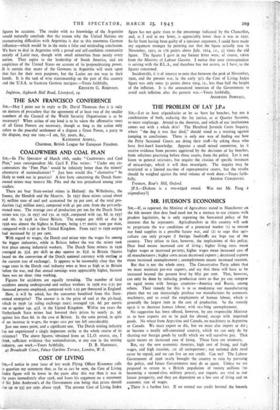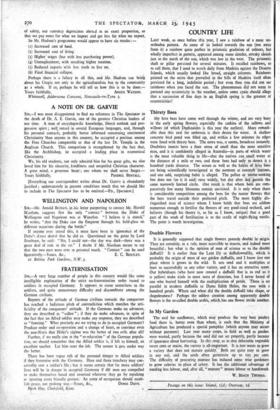MR. HUDSON'S ECONOMICS
as reported, the Minister of Agriculture stated in Manchester on the 6th instant that dear food need not be a menace to our citizens with prudent legislation, he is only repeating the forecasted policy of the interests that he represents. Agriculturalists in this country will seek to perpetuate the war conditions of a protected market (i) to ensure our food supplies in a possible future war, and (2) to urge that agri- culture can only pr3sper if foreign foodstuffs are kept out of the country. They refuse to face, however, the implications of this policy. Dear food means increased cost of living ; higher living costs mean' higher wages or increased po7erty; higher wages mean increased cost or all manufacturers ; higher costs mean decreased exports ; decreased exports mean increased unemployment ; unemployment means increased taxation.
But that is not the whole story. The Conseryative Party admit that we must maintain pre-war exports, and say that these will have to be increased beyond the present level by fifty per cent. That, however, can only be done by reducing production costs so that we can compete on equal terms with foreign countries—America and Russia among others. Their remedy for this is to so modernise otir manufacturing plants ,that we can increasingly produce our manufactures by automatic machinery, and so avoid the employment of human labour, which is generally the largest item in the cost of production. So the remedy again is to decrease human labour, with resulting unemployment.
No suggestion has been offered, however, by any responsible Minister as to how exports are to be paid for abroad, except with imported goods. No wheat from Argeotine and Canada, no machinery to Argentine or Canada. We must export or die, but we must also import or die ; or become a totally self-contained country, which we can only do by shutting out foreign goods by tariffs which we will ourselves pay. That again means an increased cost of living. These facts are axiomatic. But,, say the new economic theorists, high cost of living, and high wages, and high taxation, Lie all unimportant ; our national debt need never be repaid, and we can live on our credit. Can we? The Labour Government of 1926 nearly brought the country to ruin by pursuing this policy, and future Governments may do so again. Unless we are prepared to return to a British population of twenty millions (so becoming a second-class military power), our exports are vital to our future prosperity, and they are dependent on a low cost of living and an economic rate of wages.
, There is a further fact. If we extend our credit beyond the bounds
of safety, our currency depreciates abroLd in an exact proportion, so that ive pay more for what we import and get less for what we export. So Mr. Hudson's programme would appear to have six results :— (a) Increased cost of food.
(2) Increased cost of living (3) Higher wages (but with less purchasing power).
(4) Unemployment, with resulting higher taxation.
(5) Reduced exports with less trade to live on.
(6) Final financial collapse.
Perhaps there is a fallacy in all this, and Mr. Hudson can bridg about his Utopia not only to the agriculturalists but to the community as a whole. If so, perhaps he will tell us haw this is to be done.—



























 Previous page
Previous page